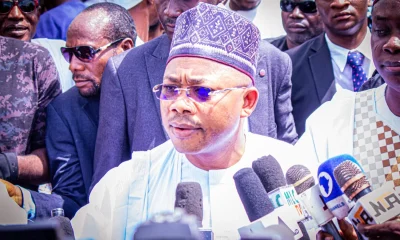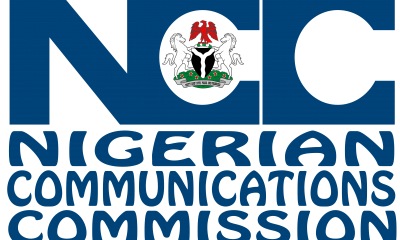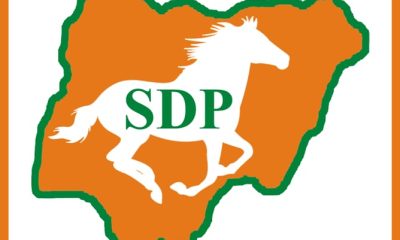BUSINESS
Nigeria’s Debt Rises by 226% in Past Seven Years – Report

.Climbs from N12.5trn in June 2015 to N39.56trn by Dec 2021
With analysts in the financial service sector impressing it on the federal government to slow down on its borrowing, it has emerged that Nigeria’s debt rose steeply by a whooping 226 per cent in seven years.
In a report, analysts at Agusto & Co.
Agusto & Co. highlighted this in its May 2022 economic newsletter titled, “Fiscal Consolidation and Debt Sustainability- Beyond the Rhetoric.”
Agusto & Co. urged the electorate to question how the next administration intends to approach fiscal consolidation and debt sustainability in the face of revenue constraints.
It stated: “The last seven years have seen Nigeria’s public debt burden skyrocket with minimal investments in infrastructure to show for it. While the Federal Government of Nigeria’s capital expenditure averaged N1.6 trillion ($3.85 billion at N415/$) over the last seven years, it has lagged behind both budgeted levels and the amount required to close the infrastructure gap estimated at $150 billion annually over the next 30 years.
“It also pales in significance when compared with its regional peers. However, during the same period, total public debt has soared by a staggering 226 per cent to N39.56 trillion in December 2021, up from N12.5 trillion in June 2015.”
It emphasised that a bloated wage bill and interest payments cumulatively 114 per cent of FGN revenue in 2021 continue to consume a substantial portion of the nation’s finances.
It added, “For more context, Nigeria spent more on non-debt recurrent expenditure in 2021 approximately N5 trillion, than its estimated revenue of N4.39 trillion within the period. This implies that it had to borrow to meet a considerable part of the public sector wage bill and its actual capital expenditure in 2021 is estimated at N3.7 trillion. Revenue growth has been significantly outpaced by the rise in expenditure. The fiscal deficit-to-GDP ratio of 6.3 per cent in 2021 has now exceeded its 3 per cent threshold over the past 5 years. The country’s revenue troubles have also been exacerbated by production and terminal shut-ins that have stopped Nigeria from benefiting from what should have been a crude oil windfall.”
The report however noted that recent efforts at tax reforms, while commendable, have been largely fixated on raising the tax rate and introducing new taxes but however noted that emphasis should be more on increasing the tax bracket.
It stated, “The phased increase of the excise duty on tobacco and alcoholic beverages between 2018 and 2020 in addition to the 50 per cent increase in Value Added Tax (VAT), from 5 per cent to 7.5 per cent in 2020, failed to yield a significant impact as the average Nigerian consumer continues to grapple with falling purchasing power and stagnating incomes.
“We believe that the revenue problem would be addressed more effectively if fiscal reforms were directed at broadening the tax base and capturing the informal economy (estimated to be around 65 per cent of GDP by the International Monetary Fund (IMF), as opposed to intensifying efforts to impose additional taxes on those already subject to taxation. The reality is that many informal businesses are compelled to pay levies, albeit informally and frequently to agents, commissioned by governments at the sub-national level, who remit agreed-upon sums to the authorities.”
“In many instances, these levies are collected regardless of whether or not the informal business earns revenue; they are compelled to comply by the prospect of force or loss and typically receive little benefit from these non-state collectors. These informal levies have also been observed to constitute a larger proportion of their incomes as they contend with multiple levies from all tiers of government. The International Center for Investigative Reporting (ICIR) estimates that Lagos State National Union of Road Transport Workers (NURTW) rakes in over N123 billion annually.
“Significantly increased domestic revenue mobilisation is essential for decreasing budgetary risks and creating policy space. Key near-term actions would include the permanent withdrawal of fuel subsidies in accordance with the Petroleum Industry Act (PIA), together with compensation measures for the poor and the efficient and transparent use of the saved resources, ”the report stated.
BUSINESS
Electricity Supply Better off before Privatization – Consumers

Torough David, Abuja
Many electricity consumers in the Federal Capital Territory (FCT), said that electricity was more regular when it was being managed by the Federal Government.
The consumers, who reside in Kubwa, Kuje, Lugbe and Gwagwalada spoke in Abuja on Wednesday.
They said that the privatisation of the power sector was a good idea, but added that it was not working as they enjoyed more hours of supply when it was managed by Power Holding Company of Nigeria, (PHCN).
Privatization of the sector in November 2013, was an initiative of the Federal Government to transfer ownership and management of power assets to private entities.
The move was to improve efficiency, attract more investments, and enhance overall electricity supply.
Eleven Electricity Distribution Companies (DisCos) and six Generation Companies (GenCos) were formed after the sector was privatised.
However, the transmission arm of the sector was retained by the Federal Government.
The consumers said that electricity was more regular when it was managed by the government before privatisation of the sector.
Benjamin Okorie, a Civil Servant residing in Kubwa said that his area does not enjoy power supply for six hours in a day.
Okorie said that when PHCN was managing the power industry before the unbundling of the sector, it was stable and regular.
“I thought the unbundling of the sector into generation, transmission and distribution was to improve power supply.
“But from what we are experiencing now, it is getting worse by the day and we are paying more for electricity,’’ he said.
Maria Manza, a businesswoman also residing in Kubwa said that power supply was epileptic in her area.
Manza said that the area had been experiencing low shedding of power for more than three months, adding that some days they don’t even get supply.
Jonathan Onoja, resident in Lugbe, Federal Housing said that power supply was not regular in his area, adding that they hardly enjoy up to eight hours supply in a day.
According to him, with the privatisation of the power industry into three segments, I thought electricity will improve.
“With the privatisation of the power sector, I thought government was doing consumers a huge favour but to my greatest surprise electricity has not improved,’’ he said.
Julius Omogiafor, a businessman residing in Gwagwalada said that electricity was better off under government management.
Omogiafor said that when PHCN was in charge of power, it was more regular than when it is now managed by three bodies.
| ReplyReply allForwardAdd reaction |
BUSINESS
Small Business Owners Lament High Cost of Doing Business

Some business owners in the Federal capital Territory (FCT), have expressed concern over the high cost of doing business presently.
According to them, they are also experiencing low patronage as many residents can no longer pay for goods and services like before.
The business owners said on Wednesday in Abuja, that the cost of doing business was making life extremely difficult for them.
They said increased transportation, cost of living, inflation, and weakened purchasing power were some of the challenges affecting their businesses.
At the Apo Fish Market, Agnes Nwafor, a foodstuff dealer, said the current economic situation had dampened the usual weekend buzz.
“People who usually come to my shop to do bulk purchases no longer do that anymore. People now buy goods per time depending on their needs.
”So many others who come around enquire about the prices of the items and end up not picking anything,” she said.
Sani Abdul, a vegetable seller at the Apo market said he had cultivated the attitude of selling almost below his cost price just to turn-over and attract more customers.
He lamented that most of his customers now purchased things on credit paying up in two or three installments depending on the amount.
”With the low influx of customers to the market today, one will think that this is not even weekend.
“Some of my co-traders in the market sell a dust bin basket of tomatoes for between N10,000 and N12,000 but I sell for N9,500, just to attract customers.
“Most customers who come to the shop either want the price of the items slashed or want to buy the product on credit and I do not blame them,” he said.
He urged the government to come to the aid of citizens and find a lasting solution to the increasing cost of doing business in the country.
Ekaite Obong, who runs a restaurant at the Gudu market area, also decried high cost of doing business and poor sales.
Obong said:” it seems like the sales keep dropping every day, every week and every month. We are not making sales anymore due to high cost of products.
”Purchasing some food items now is like acquiring gold. Even items which the price ordinarily is supposed to decrease due to its season of cultivation have not declined.
“Thus, making the cost of food high, because we have infused a little profit to our sales. So I do not blame the customers who don’t turn out in mass at all.”
Obong urged the government to tackle inflation and strengthen the naira to reduce the cost of imported goods.
“We also need policies that help local farmers and producers too. If food items are affordable, cost of food will reduce and I am sure we will get more patronage,” she said.
Similarly, Chinedu Umeh, who runs a fabric store said the situation in the country had affected both his wholesale and retail business.
“The economy is biting hard, cost of transportation is killing our businesses. The government really needs to look into this area and find a lasting solution,” he said.
Umeh suggested tax relief for small businesses and better access to credit financing to help cushion the impact of reduced sales.
“Small businesses are the engine of the economy, but we are sinking. Government must listen to us, and come to our aid,” he said.
Owoicho Ameh, who owns a farm along airport road, also decried the high cost of doing business and low sales.
Ameh said: “it is no longer business as usual for us these days as the cost of chicken feed, electricity and even transport is challenging our business.
“We struggle with these factors even with our little resources, yet, at the point of sale, customers are either not willing or able to buy.
“This is because, when we factor in our cost of production, it leads to increased cost of the birds, making many customers not able to afford it.”
Ameh said on several occasions, he sold his birds at giveaway prices, just to make sales and get funds to take care of family responsibilities.
He lamented that if he continued in that manner, he may likely go out of business in the nearest future and become jobless.
“The government sincerely needs to take urgent steps to improve the economic climate, improve infrastructure and boost the people’s confidence.
“If this is not given immediate attention, the rate of suicides is bound to increase in the country and the number of jobless citizens will increase,” Ameh said.
BUSINESS
FG Inaugurates CNG Buses to Boost Staff Welfare

The Federal Government has reiterated its commitment to institutional performance and staff welfare with the inauguration of Compressed Natural Gas (CNG) buses at the Federal Ministry of Finance in Abuja
This was contained in a statement by the Director, Information and Public Relations of the ministry, Mohammed Manga.
Meanwhile, the Minister of Finance and Coordinating Minister of the Economy, Wale Edun, while inaugurating the buses, announced the reintroduction of essential provisions for the staff.
Edun described the move as part of a broader push to energise the ministry’s workforce and improve operational efficiency.
He said that the ministry’s internal strength was vital to delivering Nigeria’s broader economic reform agenda.
“This ministry is the engine room of national transformation and that engine must be well-fuelled,’’ he said.
He said that the buses were acquired under the presidential initiative on CNG, which intends to ease staff transportation while advancing the country’s shift to cleaner, cheaper energy sources.
The minister said that the initiative aligned with the ministry’s values of fiscal prudence, transparency and environmental responsibility.
Edun underscored the critical role of staff welfare in delivering Nigeria’s economic reform agenda.
He announced the revival of monthly welfare provisions to staff, a practical gesture aimed at fostering morale and stability as the ministry leads the charge on macroeconomic reform.
The Permanent Secretary of the Ministry, Lydia Jafiya, urged the staff to remain committed, disciplined and professional as the ministry continues to steer the country through a period of economic transition.
“As the country pursues tough but necessary policy shifts ranging from treasury digitalisation to market stabilisation, the ministry’s internal unity and external credibility remain pivotal to achieving inclusive growth and restoring investor confidence,” she said.
Jafiya also commended the minister’s leadership and hard work.
The Chairman of the Presidential Initiative on CNG, Ismaeel Ahmed, reiterated the programme’s mission to mainstream cleaner transport across government institutions and stimulate local industrial value chains.
| ReplyReply allForwardAdd reaction |
































